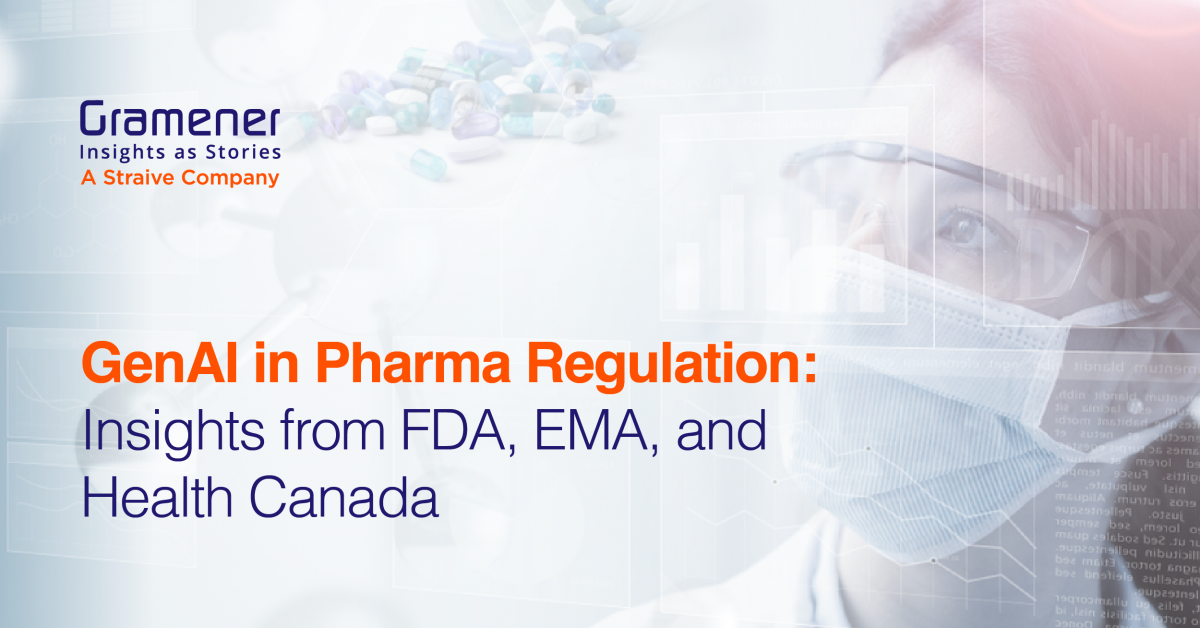The U.S. Food and Drug Administration’s (FDA) stance on GenAI is clear: it’s a groundbreaking advancement with huge potential, particularly in healthcare. However, ensuring accuracy and safety remains paramount amidst concerns about transparency and misuse. Meanwhile, Health Canada approaches GenAI with cautious optimism, emphasizing responsible development and management through initiatives like the Voluntary Code of Conduct. This blog shares the perspectives of key regulatory bodies—FDA, European Medicines Agency (EMA), and Health Canada—on GenAI in pharmaceuticals.
Table of Contents
FDA on Use of GenAI in Pharma Regulation
The FDA permits AI as a medical device, focusing on securing the algorithm. It’s a preapproved model after rigorous testing and validation.
Despite its benefits in medical imaging and mental health care access, GenAI lacks a robust regulatory framework.
AI’s prowess in managing data is crucial, moving healthcare towards personalized medicine. As data complexity grows, AI becomes vital for interpretation.
AI’s role in in-silico clinical trials shows promise, offering insights into drug development pre-trials. In mental health, GenAI, particularly LLMs, aids patient interaction and resource-seeking, complementing practitioners.
Educational institutions must match AI’s innovation pace, targeting younger generations for sustainability. FDA’s focus on fixing the drug shortage crisis could leverage AI’s potential in digital supply chains, transforming internal operations.
The FDA’s discussion on the potential of GenAI in pharmaceuticals highlights two critical areas: personalized medicine and digital supply chains. Personalized medicine, enabled by GenAI’s ability to analyze vast amounts of patient data, promises tailored treatments for individuals, maximizing efficacy and minimizing adverse effects.
Moreover, GenAI holds the key to revolutionizing digital supply chains within the pharmaceutical industry. By optimizing inventory management, predicting demand, and streamlining distribution processes, GenAI can mitigate drug shortages and ensure timely access to medications. These advancements signify a promising future where GenAI plays a pivotal role in shaping the landscape of healthcare delivery and accessibility.
The FDA released a discussion paper addressing AI and ML in drug and biological product development, outlining opportunities and challenges. It stresses a risk-based approach, advocating for secure, transparent AI systems free from biases or errors.
The FDA eagerly engages stakeholders on AI in drug development, scheduling a workshop. They highlight AI/ML risks, like error increase and bias introduction from data sets, and note limited explainability’s impact on transparency.
In the US, varied state and city regulations on AI exist, with some established and others in development. Regulatory bodies like the FDA are crafting guidelines for AI in drug development, urging a risk-based approach among companies.
EMA on the Use of GenAI in Pharma Regulation
A recent survey from the Pistoia Alliance revealed that AI and machine learning (ML) will be the top technology investment for 60% of life sciences companies over the next two years.
GenAI changes the dynamic in two ways: by escalating the level of automation possible and increasing the innovation potential.
In the regulatory space, AI/ML is utilized to pre-populate submissions to authorities, such as pre-filling set fields. GenAI could enhance this further by generating roughly 95% of that content. With appropriate oversight, it has the potential to significantly boost efficiency and reduce the time required for regulatory submissions.
The EMA encourages AI integration in drug development, while the MHRA awaits formal AI reflections. EMA’s draft AI paper guides AI use in EU drug development. The EU’s AI Act ensures trustworthy, transparent AI systems, particularly in high-risk sectors like healthcare and finance.
Health Canada on the Use GenAI in Pharma Regulation
The FDA views generative AI, like ChatGPT, as a groundbreaking advancement, democratizing AI accessibility and offering transformative potential in healthcare; however, it emphasizes the need for human oversight to ensure accuracy and safety in medical applications amidst concerns regarding transparency and misuse.
Health Canada and the Canadian government view generative AI with cautious optimism, recognizing its vast potential in various sectors, including healthcare, while emphasizing the need for responsible development and management.
The government has launched a Voluntary Code of Conduct for the Responsible Development and Management of Advanced Generative AI Systems. This code aims to set standards for accountability, safety, fairness, transparency, human oversight, and robustness in AI systems.
Additionally, the government is actively consulting stakeholders to understand better and address the implications of generative AI for copyright, ensuring that the rights of original content creators are respected and that AI is used ethically and responsibly.
This approach reflects a broader commitment to ensuring that AI technology, including its application in healthcare and other areas, is developed and utilized in ways that are safe, equitable, and transparent, with a strong emphasis on human oversight and ethical considerations.
Health Canada hasn’t issued explicit guidelines on generative AI in healthcare but stresses responsible AI development, echoing Canada’s broader AI strategy. They explore AI’s potential in medical tasks, collaborating for AI-driven diagnostic tools. While no specific regulations exist, transparency and ethics remain key priorities, reflected in the Voluntary Code of Conduct on Advanced Generative AI Systems, co-developed by Health Canada.
Get Compliant with Gramener
We help safeguard your patient data in clinical trial reports with the GenAI-powered AInonymize platform, which supports pharma companies in accelerating the clinical trial process. Our AInonymize platform, which uses advanced analytics, ensures compliance with stringent regulations regarding anonymized patient data.
With AInonymize, organizations can streamline their compliance efforts, reduce manual labor, and enhance overall efficiency in clinical trial reporting. Our solution marks a significant step forward in balancing data privacy concerns with the imperative for swift regulatory adherence in the healthcare sector.





Thank you for this insightful blog! The integration of Gen AI in the pharma sector, as outlined by FDA, EMA, and Health Canada, is transformative.